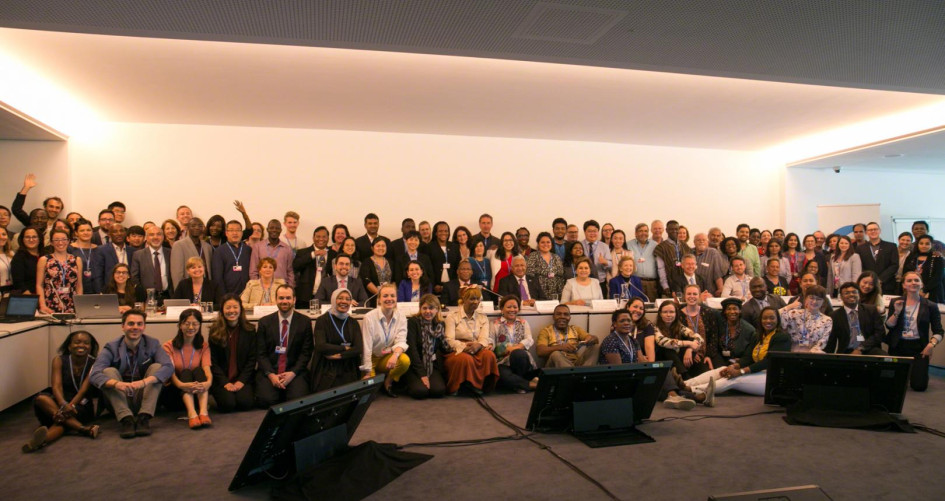UN Climate Change News, 10 May 2018 – Virtually everyone can agree that success tackling climate change will require an informed public, actively engaged. So, when national representatives, civil society and youth gathered for the 6th Dialogue on Action for Climate Empowerment (ACE) this week the discussion was all about solutions.
The President of Fiji, Frank Bainimarama, at the opening of the Dialogue on 8 May called on the 120 present to look for opportunities for “meaningful, decisive action that really makes a difference.”
The President, whose country holds the Presidency of the Conference of the Parties (COP) to the UN Framework Convention on Climate Change until the next COP, this December in Poland, said he has been questioned for championing inclusive, Pacific-Island-style discussions called "Talanoa" to confront climate change when action is required. “Dialogue is an important staging post on the way to action,” the President said. “Lets talk, lets listen, lets discover. The journey begins at the grassroots.”
Fiji has this year experienced back-to-back cyclones that have claimed lives, left people homeless and destroyed infrastructure. Those who have witnessed the effects of climate change need no convincing, while some other people, somewhat removed from the issue, still do, explained Mr. Bainimarama, who expressed pride in his country’s efforts to engage the youth constituency and mobilize gender issues in the international climate process.
The Dialogue covered public awareness, participation and access to information, with a cross-cutting focus on international cooperation, which together with education and training are known as ACE in the UN Climate Change process. Participants came up with a long list of ideas and approaches to enhance ACE, such as stressing the need for two-way-communication, knowledge of audiences, finding appropriate and novel channels for reaching people, and the importance of delivering solutions alongside climate change warnings.
“National governments alone cannot deliver success on climate change,” said UN Climate Change Executive Secretary Patricia Espinosa. She expressed concern over a “worrying trend of people turning inward” when what is required is to “make the world bigger,” a message of inclusion that seemed to resonate with the participants from dozens of countries and diverse areas of work.
At the opening of the second day of the two-day Dialogue, former Republic of Ireland President Mary Robinson urged participants to listen to women and those on the front lines of climate change.
Recalling remarks from one such local woman on the front lines of the climate issue, Ms. Robinson said it is not the case that people have no voice, but rather unfairly that there are people “deliberately silenced or preferably unheard.”
“Women are among the most vulnerable, and they hold experience and solutions,” said Ms. Robinson, who now heads a foundation that bears her name dedicated to climate justice. “Ensuring women are represented in decision making will lead to more robust and impactful decisions.”
Nations recognized the critical importance of ACE concerns in Article 6 of the Convention and Article 12 of the Paris Climate Change Agreement, articles that are “fundamental to enabling low emission development and achieving climate resilience,” said Emmanuel Dlamini, Chair of the Subsidiary Body for Implementation, a key body holding negotiations that end here today in Bonn.
Benjamin Schachter, a human rights officer at the UN Commission on Human Rights stressed the obligation of states to “respect and promote human rights in the implementation of the Paris Agreement.”
“Access to information is a human right,” he said, highlighting three items agreed under the UN Climate Change process that improve such access: a platform for indigenous and local community climate action, the Gender Action Plan spearheaded by Fiji at COP23, and ACE. The guidelines for implementation of the Paris Agreement, now being negotiated in Bonn, should make clear and deliver on the binding obligation to human rights inherent in the Agreement, he said.
This week, countries agreed on a draft decision on ACE, which will be forwarded the next COP in Katowice, Poland. It was the first decision crafted for what will become the implementation guidelines for the Paris Agreement.
A key contributor to the draft decision was the youth constituency at the Bonn negotiations, which held an ACE Youth Forum on 29 April, the Sunday before negotiations started, the report of which informed a workshop and negotiations in the first week and forms an annex to the draft decision.
